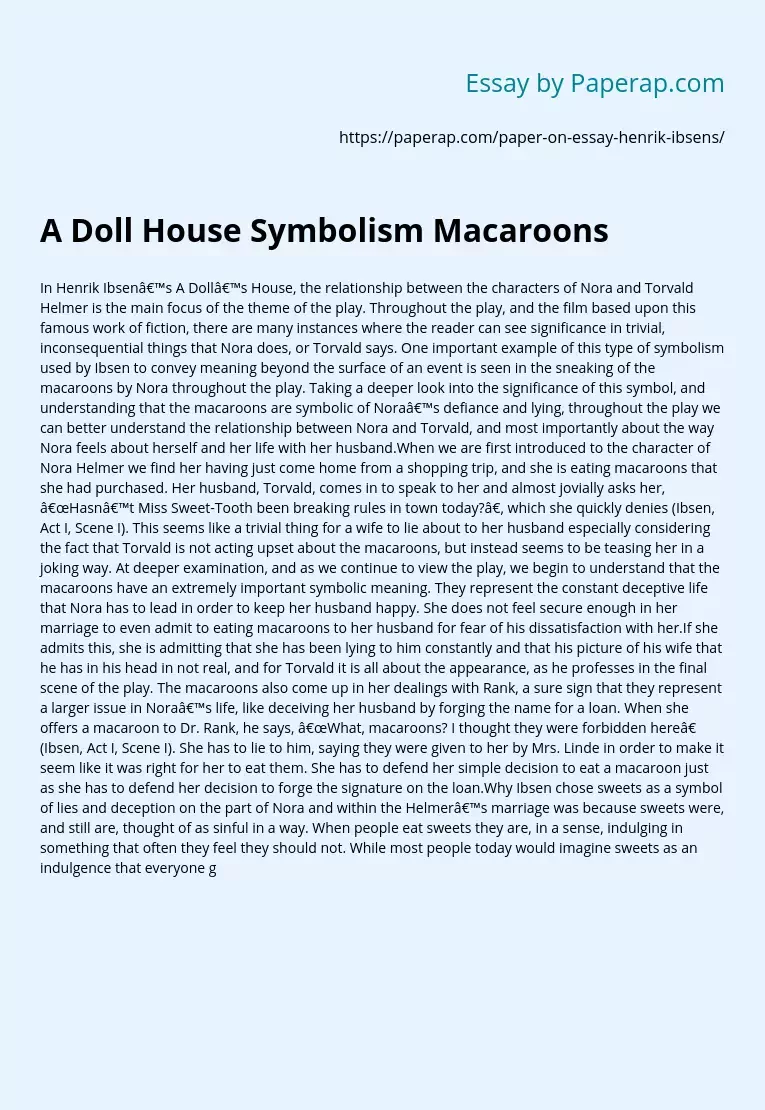A Doll House Symbolism Macaroons
In Henrik Ibsen’s A Doll’s House, the relationship between the characters of Nora and Torvald Helmer is the main focus of the theme of the play. Throughout the play, and the film based upon this famous work of fiction, there are many instances where the reader can see significance in trivial, inconsequential things that Nora does, or Torvald says. One important example of this type of symbolism used by Ibsen to convey meaning beyond the surface of an event is seen in the sneaking of the macaroons by Nora throughout the play.
Taking a deeper look into the significance of this symbol, and understanding that the macaroons are symbolic of Nora’s defiance and lying, throughout the play we can better understand the relationship between Nora and Torvald, and most importantly about the way Nora feels about herself and her life with her husband.When we are first introduced to the character of Nora Helmer we find her having just come home from a shopping trip, and she is eating macaroons that she had purchased.
Her husband, Torvald, comes in to speak to her and almost jovially asks her, “Hasn’t Miss Sweet-Tooth been breaking rules in town today?”, which she quickly denies (Ibsen, Act I, Scene I). This seems like a trivial thing for a wife to lie about to her husband especially considering the fact that Torvald is not acting upset about the macaroons, but instead seems to be teasing her in a joking way. At deeper examination, and as we continue to view the play, we begin to understand that the macaroons have an extremely important symbolic meaning.
They represent the constant deceptive life that Nora has to lead in order to keep her husband happy. She does not feel secure enough in her marriage to even admit to eating macaroons to her husband for fear of his dissatisfaction with her.If she admits this, she is admitting that she has been lying to him constantly and that his picture of his wife that he has in his head in not real, and for Torvald it is all about the appearance, as he professes in the final scene of the play. The macaroons also come up in her dealings with Rank, a sure sign that they represent a larger issue in Nora’s life, like deceiving her husband by forging the name for a loan. When she offers a macaroon to Dr. Rank, he says, “What, macaroons? I thought they were forbidden here” (Ibsen, Act I, Scene I). She has to lie to him, saying they were given to her by Mrs. Linde in order to make it seem like it was right for her to eat them. She has to defend her simple decision to eat a macaroon just as she has to defend her decision to forge the signature on the loan.Why Ibsen chose sweets as a symbol of lies and deception on the part of Nora and within the Helmer’s marriage was because sweets were, and still are, thought of as sinful in a way. When people eat sweets they are, in a sense, indulging in something that often they feel they should not. While most people today would imagine sweets as an indulgence that everyone gives in to, to Torvald the macaroons represent something within the character of Nora that he does not like: defiance of his wishes. He tells her to not eat macaroons, and she does anyway. In many things Nora tries to appear as if she is submissive to her husband. She buys a dress so she can do the dance her husband has taught her at the Christmas party, she acts childish around him in order to make him feel like the head of the household indulging his sweet wife, and tries to do everything the way her husband wants her to, at least in appearance. The macaroons represent the part of her that is not submissive, the part of her that is desperate to break out and be herself and not have to hide her true self from her husband. Throughout the play, this becomes one of the most important aspects of what is happening to Nora as an individual, and why in the end she leaves her husband and her family in search of a new life.The play, and ultimately the film, A Doll’s House is a story about a woman who has to live her life in fear of being found out for who she is. The macaroons and other sweets that she indulges in throughout the play are a symbol of the larger picture of her marriage, which is built on lies and deception, and her own internal struggle to rebel against the role that society and her husband have carved out for her.
A Doll House Symbolism Macaroons. (2019, Dec 05). Retrieved from https://paperap.com/paper-on-essay-henrik-ibsens/

